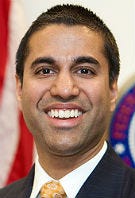High-Stakes Legal Battle Shaping Up Over California Net Neutrality Law
The Federal Communications Commission voted last December to end net neutrality.

The Trump administration wasted no time challenging California’s newly signed law that restores net neutrality in that state, calling it “extreme” and “illegal.”
Last December, the Federal Communications Commission voted 3-2 in favor of repealing the rules, a big win for companies such as AT&T, Verizon and Comcast that control much of the residential internet landscape. FCC Chairman Ajit Pai led the commission’s initiative to end the regulations, saying that they stifled innovation and competition.

FCC’s Ajit Pai
On Sunday, California Gov. Jerry Brown signed SB 822 to impose new regulations on internet service providers operating in the state. The Department of Justice (DOJ) then immediately announced its lawsuit, saying the law unlawfully imposes burdens on the federal government’s deregulatory approach to the internet.
“I’m pleased the (DOJ) has filed this suit,” Pai said. “The internet is inherently an interstate information service. As such, only the federal government can set policy in this area. And the U.S. Court of Appeals for the Eighth Circuit recently reaffirmed that state regulation of information services is preempted by federal law.”
Jason Blackwell, IDC’s research director of consumer multiplay and SMB telecom, tells Channel Partners that California will “definitely face a challenge from the DOJ in terms of implementing legislation for a service that crosses state lines and impacts national and multinational entities.”
“Since the DOJ is suing California over the net-neutrality legislation, it is likely that other states may take a wait-and-see approach to implementing their own similar regulations,” he said.
Jessica Ortega, SiteLock product marketing associate and member of its research team, said California’s new law is likely to face a “very heated court battle, potentially going all the way to the Supreme Court because the current federal administration and FCC leadership have been vocally opposed to this type of regulation.”

SiteLock’s Jessica Ortega
“At this time, only Washington [state] has enacted a law restoring net neutrality guidelines, but this law is not as comprehensive as California’s version,” she said. “It is likely that other states will enact similar laws and later join the court battle over the regulations, potentially as additional defendants. The stakes for these lawsuits are very high because if California wins, it would essentially force the federal government to restore these rules at a national level. As the largest state, California consumer laws often set the tone for the rest of the country because companies manufacture products to meet these laws and ship them nationwide.”
The potential outcomes from reversing net-neutrality regulations aren’t entirely clear, but it likely will result in negative impacts on broadband consumers, Blackwell said. U.S. broadband customers already face a market where “there is little competition as many areas are served by only one internet service provider,” he said. In other cases where both cable and telco internet service is available, cable operators typically offer much higher speeds, making the telco offer less enticing, he said.
“Those who support the removal of net-neutrality regulations often argue that ISPs are not incentivized to invest in network improvements under the current rules,” he said. “However, during the last two years, the number of gigabit internet services being offered across the country has increased significantly. Both telcos and cable operators have been investing in fiber, and large and small cable operators have upgraded their networks to data over cable service interface specification (DOCSIS 3.1), increasing the available speeds in many areas. At the same time, broadband average revenue per user (ARPU) has continued to increase.”
Customers are paying more and, in some cases, getting more, Blackwell said.
“But what will happen with the end of net neutrality?” he said. “Will ISPs really be willing to invest more or will they just …
… reap the rewards of paid fast lanes from charging content providers to deliver their content, while also increasing customers’ monthly bills? It’s not clear how or if this will lead to increased investments and enhanced end user satisfaction.”
USTelecom, which represents AT&T, Verizon and other telcos, opposes states’ efforts to restore net neutrality.
“We all support strong and enforceable net-neutrality protections for every American — regardless of where they may live,” said Jonathan Spalter, its president and CEO. “But this bill is neither the way to get there, nor will it help advance the promise and potential of California’s innovation DNA. Rather than 50 states stepping in with their own conflicting open internet solutions, we need Congress to step up with a national framework for the whole internet ecosystem and resolve this issue once and for all.”
Small Business Majority, a national small business advocacy organization, supports the new law, saying “without protections to keep the internet fair and open, California’s small businesses would have been at a disadvantage when trying to compete with large corporations that have the resources to ensure their websites receive special prioritization from internet service providers.”
“Until that disastrous FCC move is overturned, states must act to protect small firms that cannot afford for their websites to receive priority from internet service providers,” said Mark Herbert, the group’s California director.
Read more about:
AgentsAbout the Author(s)
You May Also Like


